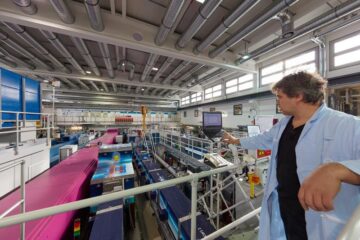5th International FOKUS IMS Workshop 2009

Fraunhofer FOKUS is continuing its successful series of IMS Workshops. The 5th IMS Workshop will be held from 11th to 12th of November 2009 at the Berlin based institute in Germany. For this year's event FOKUS is partnering with FOKUSfriends & DLC e.V., and the Chair for Next Generation Networks (AV) at the Technische Universität Berlin.
As in the past years, the workshop addresses IP Multimedia Systems (IMS). But the scope of the event in 2009 has been extended, covering a broader range of topics:
Next Generation Networks (NGN) as well as Next Generation Mobile Networks (NGMNs), Service Oriented Architectures, Open Network API, Web 2.0, Rich Information Applications (RIA) and the evolution of infrastructures and services for the emerging Future Internet.
A meeting point for technology experts the workshop is aimed at specialists from academia, research labs, industries and operators around the world. On the first day four parallel tracks will each feature a tutorial in the morning and an interactive workshop in the afternoon. The tracks topics are:
Rich Communications and Telco 2.0, IPTV & Media Convergence, Future Internet, NGMN & Evolved Packet Core (EPC).
The second day is organized as a conference. It will bring together the topics under the heading „IMS and SDP evolution in view of the emerging Future Internet“.
Detailed information and registration forms are provided on the IMS Workshop Homepage. Those who register early can get an all-inclusive package – including one tutorial, one workshop, social event, conference and lunch – for EUR 700. Normal registration starts on 2nd September 2009 and costs EUR 900.
Contact
Brigitte Henckel
ims-event@fokus.fraunhofer.de
Tel +49 30-3463-7300
Media Contact
Alle Nachrichten aus der Kategorie: Seminare Workshops
Neueste Beiträge

Bakterien für klimaneutrale Chemikalien der Zukunft
Forschende an der ETH Zürich haben Bakterien im Labor so herangezüchtet, dass sie Methanol effizient verwerten können. Jetzt lässt sich der Stoffwechsel dieser Bakterien anzapfen, um wertvolle Produkte herzustellen, die…

Batterien: Heute die Materialien von morgen modellieren
Welche Faktoren bestimmen, wie schnell sich eine Batterie laden lässt? Dieser und weiteren Fragen gehen Forschende am Karlsruher Institut für Technologie (KIT) mit computergestützten Simulationen nach. Mikrostrukturmodelle tragen dazu bei,…

Porosität von Sedimentgestein mit Neutronen untersucht
Forschung am FRM II zu geologischen Lagerstätten. Dauerhafte unterirdische Lagerung von CO2 Poren so klein wie Bakterien Porenmessung mit Neutronen auf den Nanometer genau Ob Sedimentgesteine fossile Kohlenwasserstoffe speichern können…





















